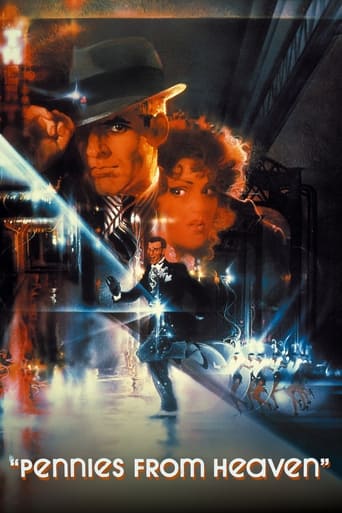BroadcastChic
Excellent, a Must See
Solidrariol
Am I Missing Something?
Sameer Callahan
It really made me laugh, but for some moments I was tearing up because I could relate so much.
Francene Odetta
It's simply great fun, a winsome film and an occasionally over-the-top luxury fantasy that never flags.
SnoopyStyle
It's 1934 Chicago. Sheet music salesman Arthur Parker (Steve Martin) can't get any love from his wife Joan (Jessica Harper) both in the bedroom and in the bank book. She wants to keep her inheritance for a rainy day but he wants to use it for his business. He befriends penniless hitchhiking Accordion Man. He falls for school teacher Eileen (Bernadette Peters) and they have a short affair as he lies to her about being a widow telling her to "take the pain away". His wife Joan entices him back with sex and money. Eileen is fired for being pregnant out of wedlock. Arthur meets a blind girl calling her beautiful. Later the Accordion Man rapes her and kills her. A desperate Eileen falls into the arms of Tom the pimp (Christopher Walken).This is a sad depressing movie juxtaposed by the bright shiny surreal song and dance show. The story is such a downer. Arthur is a horrible person. Eileen is an innocent that is destroyed. There is a horrible crime. Yet this is a fantasy with dance reminiscent of the 30s except darker. It's a very odd mix and is almost experimental in its nature. It's definitely not a comedy.
Robert J. Maxwell
It's the depths of the depression in 1930s Chicago. Willie Loman -- I mean Steve Martin -- tries to sell sheet music. He loves the songs, although business is not going too well. He'd like to own his own record store but hasn't the capital. That stash belongs to his soulless wife, Jessica Harper, who believes that sex is dirty and wishes someone would cut Martin's "thing" off. For all that, he at least has an unprepossessing but adequate lower middle-class home. It's just that he has this itch that things could be better.Whenever he gets this itch he scratches it with a fantasy musical number. No harp arpeggios or watery dissolves. At the end of a fierce argument with the bank, there's a sudden cut and he and the banker are arm in arm, dancing and singing some song from the 1930s. The original recording plays. Sometimes Martin's voice is that of the female.True to his magical thinking, he falls in love at first sight with Bernadette Peters, a shy school teacher. He pursues her, seduces her, and impregnates her, which leads to her being fired, finding employment under a pimp (Christopher Walken), and running off with Martin without any plans. Their car breaks down under a bridge. Martin is arrested for a murder he never committed and hanged -- except that he and Peters kind of break the fourth wall and come together in a clinch at the end, with Martin observing that every movie must have a happy ending.Well, no movie with Christopher Walken dancing on top of a bar in a louche saloon, and Tommy Rall hurling himself through the air, can be all bad. And this isn't all bad. The dancing is surprisingly effective. Herb Ross, the director, used to stage and choreograph musicals and he knows what he's doing. The songs are Golden Oldies, with vocals by Rudy Valee, Bing Crosby, and Betty Boop. Bernadette Peters has a kewpie doll face, full of sex, and she has a firm grasp on her role.But the movie isn't an entire success either. It's more or less torpedoed by its own ambition. It seeks to evoke the desperation of the depression and it does the job all too well. The clothing is drab, the set dressing ditto, the characters hopeless, and the story bleak, except for that happy ending, straight out of Ambrose Bierce's "An Occurrence at Owl Creek Bridge." The sepulchral picture of real life overwhelms the plot and the musical numbers seem more like distractions than anything else. Yes, Martin does a fine imitation of Fred Astaire dancing with Ginger Rogers to "Let's Face the Music and Dance," twirling around and holding his hands in the air, but I kept wondering WHAT'S GOING TO HAPPEN TO HIM? For what it's worth, I seem to recall even better mimicry of Astaire by Martin on Saturday Night Live, with Martin falling over the furniture and eventually, happily, smilingly, tap dancing his way through a penthouse window.That SNL sketch was amusing. The movie prompts you to slit your wrists.
GeoPierpont
Being a huge fan of 30's musicals, was not disappointed in the American sanitized version of inciting the audience to appreciate the pure beauty of longing expressed in their lyrics... very moving and took me back in time like no other Fred and Ginger Holiday Parade...Was extremely impressed with Walken's impeccable rousing dance routine and exquisite precision... being so accustomed to his typical despairing roles, only wanted more.... The mash up on the big screen with Fred and Ginger was yet another exciting performance and created a yearning for more Broadway dance numbers, which are amply provided in the final scenes... bravo!!! High recommend for fans of depression era lyrics and original music, tap dancing from unexpected performers with a splash of an 80's touch.
johnstonjames
there are few film musicals the caliber of Herbert Ross's 'Pennies From Heaven'. and that is is of considerable debate in the film community. many critics felt it was somewhat failed dramatically and didn't live up to the BBC series it proceeded. even one of the immortals of film musicals, Fred Astaire, denounced it's morbid tone as "depressing" and said the film had nothing to do with the spirit of 30's film musicals.well. what does Fred Astaire know about filmmaking anyway? or history for that matter? even if he was there. Astaire is a dancer and a actor. not a screenwriter. not every good piece of filmmaking requires a happy ending or optimistic outlook. and as for the 1930's, well, it was the great American depression of the twentieth century, need i say more? you can imagine it was pretty bleak for a lot of Americans.the tragedy, bleakness,and even, sexual repression of that time period, are what the study and analysis that this remarkable film delves into. it also uses a style and process of juxtaposition that is the best example i can think of ever, in almost any form of art outside of music, which is a little harder for me to grasp. juxtaposition is a rather basic concept in art, but it can seem unoriginal or contrived when used without any real meaning or reason.in 'Pennies From Heaven', juxtaposition is utilized and explored to it's fullest potential. we often see the dreary hopelessness and ruin of the main characters lives as opposed to how the iconic images of the time perceived life and reality. in the movies, especially musicals like 'Gay Divorcée' or 'Top Hat', life was anti-septic and glamorous and protagonist were most often millionaires or heiresses. the only poor people you ever saw were black people as servants and bellhops, and they were always, clean and chipper and ready to serve. a total irony and unreality considering so many people were on hard times and even the middle class was trying to make ends meet day to day. it must have been very surreal to people to see the reality Hollywood perceived for them and then go home and have to deal with the hard truth. not just about society, but about themselves as opposed to the fictionalized stereotypes they were constantly exposed to.much of the juxtaposition in 'Pennies' is downright ruthless. the main characters often imagine their way out of life's hard realities by seeing themselves as Fred Astaire and Ginger Rodgers types in a movie musical. the cynicism of this perspective is only undermined by a often whimsical sense of humour, which is at times unexpected and oddball quaint. the film's humour is evident in scenes like the one where the children in Bernadette Peter's elementary school class transform from ordinary, unremarkable and drab, into immaculate, child musical prodigies playing instruments, and dancing on white pianos wearing white tuxedos. the musical number where Steve Martin imagines success over his failure is equally humorous and farcical.the film is also kept from being too downbeat because of praiseworthy performances by Martin and Peters. it's impossible to feel too dreary about performances that are this good with dramatic depth as well as energetic vitality. Martin and Peters give, in my opinion, some of the most memorable performances in cinema. as memorable as any immortal legend in film musicals of the past because aside from dancing, and some singing (mostly lip synced), there is more required of them dramatically than the musical actors from the old time-golden age. Martin and Peters are classic examples of brilliant performances egregiously overlooked by the Oscars.Christopher Walken, who can dance up the weather, and 'Phantom of the Paradise' star Jessica Harper also give some vivid supporting performances. Harper's performance, as Martin's judgmental and withholding wife, is especially complicated because of it's frustrating unlikability. Harper also has a hilarious moment where she imagines attacking Steve Martin with a pair of scissors after feeling violated sexually. classic as to how 'Pennies' is both peculiar, funny and depressingly hopeless and drab simultaneously.the fact that 'Pennies' elicits a variety of emotional responses and deals with contrasting moods, is so much of why juxtaposition was possibly the only approach to bring off it's complex insights into society and the human condition. which are profoundly obvious and affecting.the cinema style is so original as well as is the off the wall screenplay that reads like something straight out of Lars Von Trier and has a ending similar to the film noir classic 'Detour'.i hope i'm being fair here. it's been decades since i've seen the BBC mini series and i just watched this film the other night. i don't know if it stands up to the BBC film because i can't remember a thing about that version except that it had Bob Hoskins. i'd have to believe, however, a film that appears this good, must be able to stand on it's own merits.musicals aren't always the stuff and making of good cinema. often the musical moments themselves can drag down the timing and try viewer Patience. not so with this movie. every moment, including it's musical ones, is pure cinema and worthy as a example of cinema style and form.







